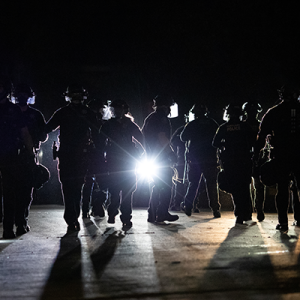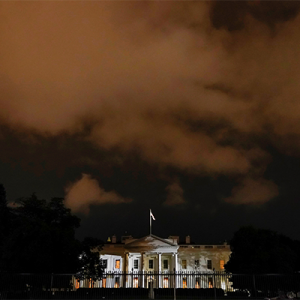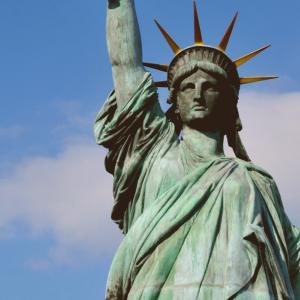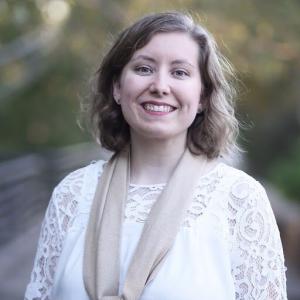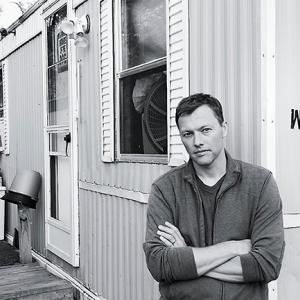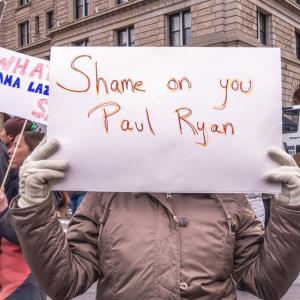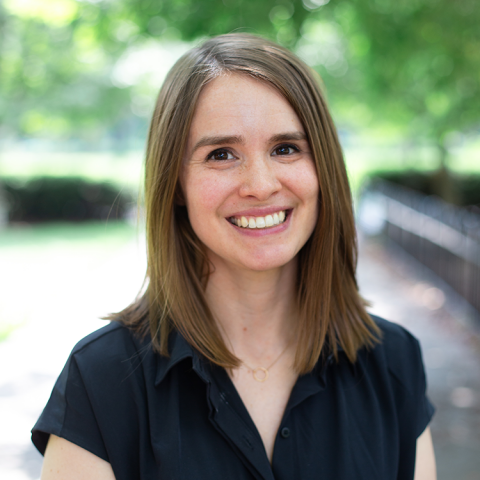
Betsy Shirley is the editor in chief of Sojourners. Her writing and multimedia work has earned awards from the Religion News Association, Associated Church Press, and Evangelical Press Association. She lives in Washington, D.C.
Betsy began working at Sojourners in 2015. Before being named editor-in-chief, Betsy served most recently as editor of sojo.net and has held editorial positions for both Sojourners’ print and online teams. She served as an editorial assistant from 2010-2011 as part of the Sojourners Fellowship Program.
Betsy earned a B.A. in English and creative writing from Butler University and a Master of Divinity from Yale Divinity School. She is a past president and current board member of the Religion News Association; she additionally serves on the board of the Religion News Foundation.
Posts By This Author
Don’t Read This If You’re Baking Cookies: What Our Editors Are Reading
Web traffic slumps in mid-December, that’s just the way the internet works. And we — the people who make the internet, or at least, Sojourners’ humble corner of it — never much mind because we assume it means you are busy doing wholesome things like baking cookies, building snowfolk, or calling your elected officials to voice your support for the newest bipartisan COVID-19 relief bill.
Unbelievable: What Our Editors Are Reading
Believe it or not, here we are. In the 10 stories below, you’ll see people wrestling with — and sometimes accepting — all the changes life throws our way.
Shared Anger, Shared Values: What Our Editors Are Reading
The CDC urges Americans to avoid Thanksgiving travel, delayed election certification, tips for countering misinformation, and other stories our editors are reading.
Time for New Traditions: What Our Editors Are Reading
New rituals to bury our dead, how political candidates engage with religious voters, our tendency to doomscroll, and other stories are editors are reading this week.
It's Spooky Season: What Our Editors Are Reading
Techno-authoritarianism, Christian nationalism, election fairness, and other stories about things we fear and how to get us all through safely.
Flying in the Face of Injustice: What Our Editors Are Reading
This week’s picks from our editors include a little bit of humor (a new film that satirizes evangelical media? Yes please!) and stories to remind us of our collective power to overcome the forces of evil and enemies of justice that are so readily on display.
In Civil Unrest, How Do We Keep Each Other Safe?
NONVIOLENT PEACEFORCE is an international nonprofit that works with communities facing violence to implement nonviolent strategies to help keep them safe. They have worked with communities around the world, including in Sri Lanka, Iraq, South Sudan, and Guatemala. Mel Duncan, Rosemary Kabaki, and Jessica Skelly of Nonviolent Peaceforce spoke in mid-September with Sojourners’ Betsy Shirley about their newest project location: the United States.
Sojourners: Why did you start projects here in the U.S. this fall?
Mel Duncan: We recognize that right now there are many indicators of looming violence, whether it be strife over police brutality and racism, or the chaos that is being stirred up around the election, or the catastrophic experiences we’re seeing with climate change—all of these can trigger violence.
What risks do you see?
Jessica Skelly: As we look toward the elections and beyond, we can see some indicators for flashpoints of violence—election tampering, delays in the election, perhaps continued police brutality, instigation by agents provocateurs—and people want to know how they can mobilize in responsible and constructive ways and help de-escalate some of that violence and protect themselves.
Dreaming of Another World?: What Our Editors Are Reading This Week
“Schadenfreude,” the German term for “enjoyment obtained from the troubles of others,” became the most searched-for term today on Merriam-Webster.com. But “enjoyment” isn’t the right word for this week in which civil discourse and the U.S. refugee resettlement quotas reached another record low.
Come On, Wisconsin
The consequences of this election — voter disenfranchisement and health risks — will fall disproportionally on Wisconsinites of color. Take Milwaukee County: Typically, the county has 180 polling locations, but on April 7, there were only five polling locations available.
Why Christian Anarchists Want to ‘Burn It Down’
BEN WILDFLOWER IS a self-described “high-church lowlife.” He lives in Kensington, a Philadelphia neighborhood that’s also home to intravenous drug users and sex workers. Wildflower—the surname he and his wife adopted after their marriage—is white, bearded, and male; he grew up among conservative evangelicals but now attends an Episcopal church (“a wonderful, welcoming space for so many people alienated by the church,” he said, “but also a bizarre, bourgeois institution”). Sometimes he fixes his roommates’ bikes to cover rent; he aims to live on very little.
I came across Wildflower through his handmade religious prints that resemble the black-and-white woodcuts found in The Catholic Worker , albeit with a little more attitude: “O Mary conceived without white supremacy,” reads one of Wildflower’s prints featuring the Holy Mother using aerosol flamethrowers to destroy Confederate and Nazi symbols, “pray for us trying to dismantle this shit.”
Wildflower doesn’t love the word “anarchist” because it sounds too self-assured (“like how a super-duper Reformed person has answers for everything”) and often evokes scenes of white dudes eager to break stuff and punch cops. But he sticks with it: “I’m an anarchist because I oppose hierarchical power structures,” said Wildflower. “You apply it to sex and gender, you have ‘feminism.’ You apply it to white supremacy and racism, and you have ‘anti-racism.’ So what is it when you apply it to the modern state? I guess we don’t have a word better than ‘anarchism.’”
Does it bring joy?
IN THE PAST four years, it’s been tempting to believe the main problem with U.S. democracy is the current occupant of the White House and the electoral politics that paved his way to office. But Christian anarchists offer a different perspective.
“The thought of America crumbling should bring you joy,” Wildflower told me in an interview last spring. As Christian anarchists see it, the problems that exist in our nation—poverty, white supremacy, militarism, economic inequality, and on down the list—are not aberrations in an otherwise good system, but rather inescapable outcomes of any system where some people have been put in power over others. And as people of God, Christian anarchists feel called to dismantle these oppressive systems and create radical alternatives.
Take prisons: “I think people are valuable and shouldn’t be warehoused in cages,” said Wildflower. “I don’t think [prison] changes people; I don’t think it makes us safer; I think it’s a tool to control and impoverish communities of color. I want it to be destroyed.” Though he participates in what he calls “reformist” actions, such as voting for a better district attorney or advocating to change sentencing laws—something his younger anarchist self would have scoffed at, but that he felt was important after listening to women and people of color in his community—he doesn’t feel those actions will ever fix the underlying problem. “A system that holds people accountable for injustices looks so unimaginably different than the prison system, that I’m still totally on the ‘burn it down’ side.”
And They Were Not Ashamed
Sojourners: Why write a book on sex and faith and shame?
Matthias Roberts: Many of us who grew up within purity culture have rejected the strict, moralistic guidelines around sex and sexuality we were raised with, but aren’t sure what beliefs we do still hold. As a counselor, I noticed coping mechanisms that aren’t necessarily the mosthealthy ways to work with our sexuality. I hope to name what those unhealthy coping mechanisms are and chart a way forward.
What is sexual shame? Shame is a core response that we have that makes us turn away. When things within our sexuality make us want to turn away from either ourselves or other people, we get sexual shame. Sexual shame affects us relationally—and not just within our sexual relationships. It can look like secrecy and avoidance: We’ve been taught we can’t express sexuality outside of particular contexts and yet most people are, so we hide that away, lie about it, or pretend it’s not there.
Holy Fools and the Carnival de Resistance
The wry 20th century theologian saw the “radical and wondrous splendor” of the big top as an image of the kingdom of God: miraculous, death-defying stunts; an impending sense of both calamity and delight; parodied pantomimes of social convention—all enacted by a company of the “freaks” snubbed by polite company. “The circus is eschatological parable and social parody,” wrote Stringfellow. “It signals a transcendence of the power of death, which exposes this world as it truly is while it pioneers the kingdom.”
Drawing inspiration from the biblical covenants between God, people, and land—as well as Stringfellow’s beloved circus and other resistance traditions, including Brazilian Carnivale parades, Burning Man, West African drumming, and the warnings of Indigenous elders—the members of Holy Fool Arts pitched their tents in Philadelphia this summer to stage the seventh Carnival de Resistance, “a traveling carnival, village, and school for social change bridging the worlds of art, activism, and faith.”
During the week, the troupe partnered with local groups to paint murals, work in gardens, teach Bible studies, and join creative acts of protest. On weekends, they staged ceremonial theater performances (with a bike-powered sound system), demonstrated fossil-fuel-free living in their eco-village, and hosted an interactive carnival midway, complete with sideshow attractions, art installations, crafts, and games.
“Carnival traditions are about simultaneously subverting the dominant order while temporarily inhabiting an alternative world of festive celebration, playful mockery, and embodied community,” director Tevyn East told Sojourners. “We at the Carnival de Resistance seek to honor these long-standing traditions and spark the prophetic imagination through acts of resistance and incarnation.”
At Play in the Fields of Church and State
IN JUNE, THE U.S. SUPREME COURT ruled in favor of a Lutheran church in Missouri seeking state funding to replace the gravel yard of its playground with a softer surface made of recycled tires. But was it a victory for religious freedom or a violation of the principles separating church and state? Sojourners associate editor Betsy Shirley interviewed Charles C. Haynes, founding director of the Religious Freedom Center of the Newseum Institute, to help sort it all out.
Sojourners: Let’s start with the basics: Where does the idea of “separation of church and state” come from?
Charles Haynes: The Establishment Clause—or, more accurately, the “no establishment clause”—is the part of the First Amendment that separates church from state, preventing the entanglement of religion and government that has been the source of repression and conflict for much of human history. But it also protects the right of religious groups and individuals to participate fully in the public square of America.
Resilient Immigrants in an Unhealthy System
LAST SUMMER, THE FUTURE of for-profit prisons seemed bleak. The U.S. Department of Justice announced it would begin phasing out its use of privately run prisons and the U.S. Department of Homeland Security quickly followed suit, declaring that it would reconsider its use of privately run detention centers. Stocks for companies that ran for-profit prisons plunged.
But then Donald Trump was elected president, and private prison stocks immediately soared. The nation’s largest prison company, CoreCivic (formerly Corrections Corporation of America), reported a boost of more than 40 percent in the value of its shares. Given Trump’s promises to “create a new special deportation task force,” investors bet that privately run detention centers will play a key role.
And the investors may be right. Every year, DHS detains about 400,000 undocumented immigrants in 250 centers nationwide, and 62 percent of the beds in these centers are operated by for-profit corporations.
According to Maria-José Soerens, a licensed mental-health counselor serving undocumented immigrants in Seattle, there are two major problems with for-profit detention centers. First, for-profit centers are not held accountable to the standards that govern federally run centers. In her work in these centers, Soerens has heard complaints ranging from a lack of medical attention to inadequate opportunities for parent-child visitation; one young woman who was having suicidal thoughts was kept in solitary confinement until she told guards she was “better.”
But the deepest problem, explains Soerens, is that most detention centers only exist because corporations saw a “business opportunity.” Beginning in the early 2000s, for-profit prison companies successfully lobbied Congress to expand drastically the number of beds in the immigration detention system—a move that doubled the revenue of the two largest for-profit prison companies. In 1998, there were 14,000 beds available for immigrant detention; today, there are 34,000.
Robert E. Lee Worshipped Here
IN A SERMON that lasted less than 11 minutes, Rev. Wallace Adams-Riley suggested something no one had said from the pulpit in the long history of St. Paul’s Episcopal Church in Richmond, Va.
“What if,” asked Adams-Riley in his faint South Carolina drawl, “we begin a conversation here at St. Paul’s about the Confederate symbols here in our worship space?”
He listed examples: “The Davis window there, that identifies Jefferson Davis with St. Paul himself, in his imprisonment. Or the Lee windows there, that identifies Robert E. Lee with Moses,” he said, pointing around the sanctuary. “And there are the plaques on the walls, and two kneelers up by the old high altar. They [the kneelers] each have a little Confederate flag on them.”
The sermon was remarkable in its restraint. It wasn’t a jeremiad against the church that had, up until the 1960s, emblazoned its official stationery with “Cathedral of the Confederacy.” Nor did it mention the words that would ripple through the congregation in the months that followed, words like “racism,” “slavery,” and “reconcile.”
In fact, there weren’t many words at all. Adams-Riley’s preaching style is spare and impressionistic; his tone, much like his personality, gentle and encouraging. He quoted the Wisdom of Solomon: “The generative forces of the world are wholesome, and there is no destructive poison in them.”
“Generating. Building up. Giving life,” repeated Adams-Riley. “Strengthening. Healing. Bringing wholeness. That is what God does. And we, being made in God’s image, find our greatest fulfillment in doing likewise.”
'Too Blessed to Be Stressed'

Sean Bear/ Shutterstock
IN A GIVEN YEAR, about one in five U.S. adults will experience mental illness of some kind. And though mental illness does not discriminate, African-American adults are more likely to experience serious mental health problems, but less likely to seek treatment, than white folks, due in part to the lasting effects of slavery, segregation, and other forms of race-based exclusion—effects that translate into socioeconomic factors such as poverty, homelessness, and substance abuse which are, in turn, risk factors for mental illness.
According to the National Alliance on Mental Illness (NAMI), the factors that keep African Americans from receiving mental health services include a lack of health insurance, a distrust of the medical community, and conscious or unconscious bias among practitioners resulting in misdiagnoses. But NAMI also named another barrier to African-American mental health: the church. While one’s “spiritual leaders and faith community can provide support and reduce isolation,” explained NAMI, the church can also “be a source of distress and stigma.” The report noted that even when medical care is necessary, African Americans turn to their families, communities, and churches rather than turning to health-care professionals.
None of this comes as a surprise to Monica Coleman, a professor of constructive theology and African-American religions at Claremont School of Theology in Southern California. Throughout her new memoir, Bipolar Faith: A Black Woman’s Journey with Depression and Faith, Coleman navigates the challenges of race, gender, and the church as she heals from rape (committed by her then-boyfriend in seminary) and wrestles with a faith that ebbs and flows like the cycles of severe depression that began as she entered adulthood.
Sojourners assistant editor Betsy Shirley spoke with Coleman about mental health, social justice, and how the church might become a place that more fully fosters both.
The Power of the Poor
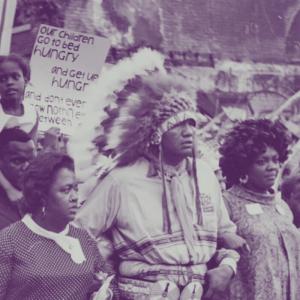
Image via poorpeoplescampaign.org / CC-BY-ND-4.0
BY MOST MEASURES, the day had been a success. On the morning of Dec. 4, 2017, nearly 300 people crammed into a small room near Washington, D.C.’s Capitol Hill to reignite the 1968 Poor People’s Campaign. Camera crews filmed while clergy, Indigenous leaders, Fight for $15, Iraq Veterans Against the War, and state groups from around the country pledged their support.
From there the leaders marched to the U.S. Capitol to deliver a letter condemning the then-looming tax bill. “Woe to those who make unjust laws,” they read from Isaiah 10, “to deprive the poor of their rights.”
Later, the same crowd—plus locals lured by a lineup featuring Sweet Honey in the Rock, Maxwell, and Van Jones—gathered at D.C.’s Howard Theater to celebrate. Faith leaders and activists who’d linked arms together in places such as Flint, Mich., Charleston, S.C., and Standing Rock in the Dakotas sipped drinks and ate free ice cream provided by Ben and Jerry’s. The overall vibe was part social-justice pep rally, part family reunion.
But Rev. William Barber II wasn’t feeling it.
While the DJ played ’80s hip-hop, Barber lumbered onto the stage unannounced. He didn’t have a microphone, so he just started yelling. The perplexed stage crew scrambled to find a working mic, but Barber was impatient. The DJ cut the music and the theater grew quiet.
“My brothers and sisters,” boomed Barber once he had a mic. “This is a Poor People’s Campaign mass meeting and concert; this is not a party.”
‘Make this nation cry’
For the next 10 minutes, Barber worked his way through the litany of injustices that he and Rev. Liz Theoharis, co-chairs of the campaign, had repeated from countless pulpits over the past year as they crisscrossed the country recruiting people for the Poor People’s Campaign: deaths caused by lack of health insurance, the rollback of voting rights, corporate drilling on Native American lands, homelessness, police violence, an unlivable minimum wage, Flint’s inability to provide its citizens with clean water, political corruption. He spoke without notes, rambling at times (“I don’t have time to be scripted because the evil that’s happening is not scripted”), but it didn’t matter; as he neared the end of his list, the mood of the room had grown somber.
Erica Lea to Become First Openly LGBTQ Lead Pastor of Mennonite Church USA
Albuquerque Mennonite Church will announce today that they have called Erica Lea to be their pastor — the first openly LGBTQ person to serve as a lead pastor in the Mennonite Church USA, a denomination that claims more than 70,000 adult members in the U.S.
Matthew Desmond Talks About the Church’s Response to Housing Instability
It’s awkward to become famous for writing about poverty. Just ask Harvard sociologist Matthew Desmond, whose book Evicted: Poverty and Profit in the American City won the 2017 Pulitzer Prize for nonfiction. For his research, Desmond spent more than a year living in trailer parks and inner-city rooming houses to document the housing struggles of eight Milwaukee families—struggles that Desmond could not forget.
“I couldn’t help but translate a bottle of wine placed in front of me at a university function or my monthly daycare bill into rent payments or bail money back in Milwaukee,” writes Desmond in Evicted. “It leaves an impression, this kind of work. Now imagine it’s your life.”
Desmond used the proceeds from Evicted to create two foundations: Just Shelter, which highlights organizations preserving affordable housing, and another to directly assist the families he writes about in the book. But Desmond doesn’t want to be lionized; he wants to reframe the conversation about poverty in America.
“When we talk about the poor, it’s almost as if we talk about them as isolated from the rest of us, as if their lives aren’t connected to ours—but they absolutely are,” Desmond told Sojourners associate editor Betsy Shirley. As he sees it, that means we all need to consider “how we receive some benefit that others don’t—and ask hard questions about the fairness of that.”
Christians Call out Paul Ryan, GOP Health Care Plan
Almost immediately after House Republicans unveiled the health care plan they hope will replace the Affordable Care Act, a number of Bible-quoting, justice-loving Christians began pointing out that the GOP's proposed replacement doesn't quite live up to Jesus's command to "heal the sick."






